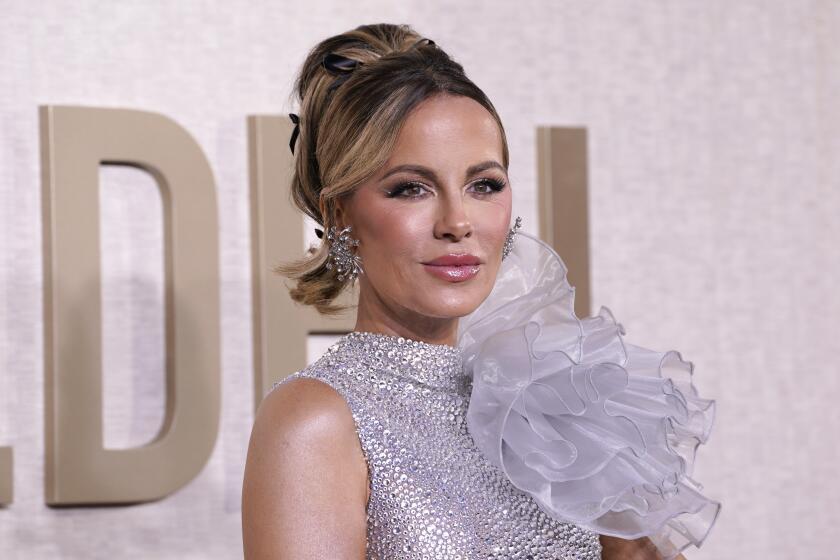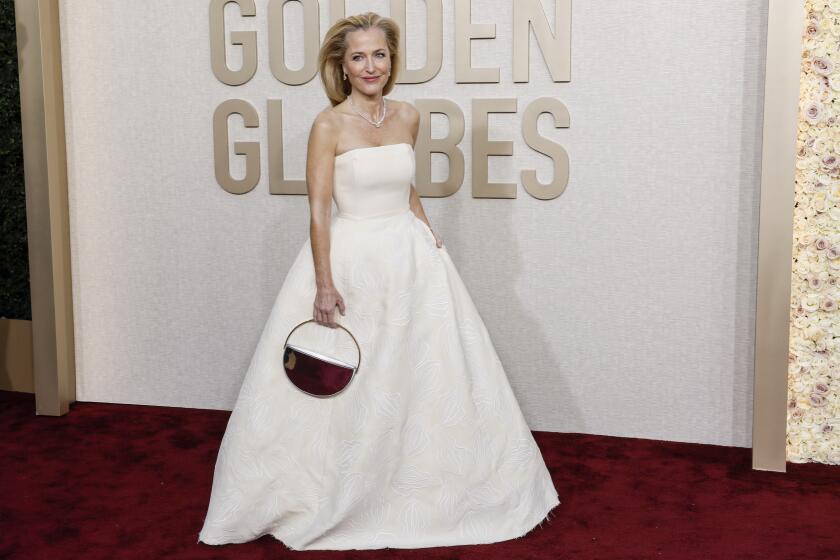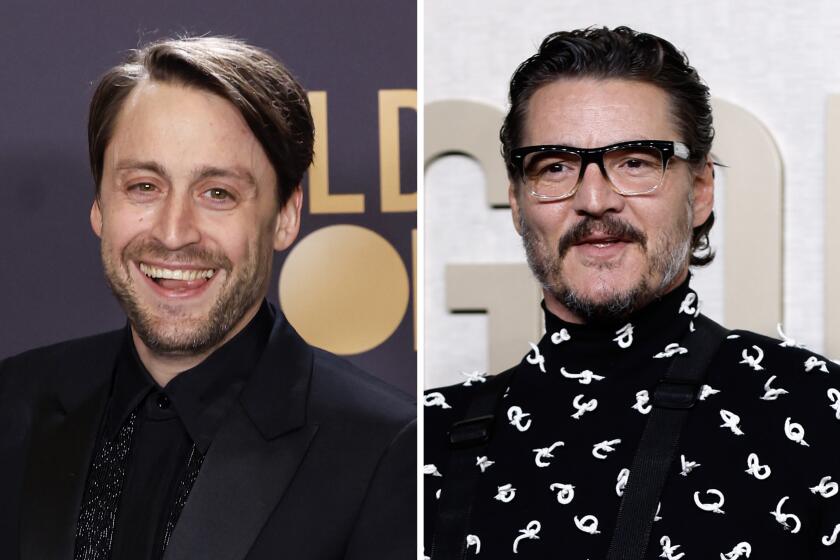How Netflix’s dominance in the Golden Globe nominations signals a new era for cinema
The battle for the future of movies has ended, and streaming has won. At least, that’s the sense one could get from Monday’s Golden Globes nominations, a key mile marker on the long road to the Academy Awards.
Having already dramatically upended the landscape of film distribution, Netflix now has its sights squarely trained on the prestige and artistic credibility that comes with gilded trophies. In the run-up to the early-morning Globes announcement, awards prognosticators were wondering to what degree the deep-pocketed streaming giant, which is fielding arguably its strongest slate of Oscar contenders to date, would flex its muscle.
The answer turned out to be: a lot.
Propelled by Martin Scorsese’s gangster epic “The Irishman,” the searing divorce drama “Marriage Story” and the Vatican-set “The Two Popes” — all three of which earned best picture nods in the drama category, along with the World War I drama “1917” and the gritty comic-book smash “Joker” — Netflix racked up a total of 17 Globes nominations in film alone. Its nearest competitor, Sony Pictures, earned 10 (if you include a pair of noms for Sony Classics’ “Pain and Glory”).
When it comes to TV, Netflix has already established itself as an awards powerhouse — and indeed, thanks to series like “The Kominsky Method,” “Unbelievable” and “The Crown,” the streamer topped its competitors in this year’s Globes derby there as well, with 17 nominations to HBO’s 15. On the film front, though, Netflix has only recently begun to make similar inroads, as it bucks against forces that regard it as an existential threat to the traditions of cinema. In 2016, the company earned just one Globes nomination: for actor Idris Elba in its first major awards contender, the drama “Beasts of No Nation.”
To overcome that resistance, Netflix has worked to bring marquee filmmakers like Scorsese, the Coen brothers and Alfonso Cu´aron, who directed last year’s best picture Oscar nominee “Roma,” into its tent, a costly investment that has begun to pay dividends.
At a time when the major studios have largely backed away from serious-minded, adult-oriented fare in favor of big-budget tent-pole spectacles, producer Emma Tillinger Koskoff, a double nominee this year for “The Irishman” and “Joker,” said she is not surprised by Netflix’s newfound dominance on the film front.
“They have great taste over there,” Koskoff said. “They’re making quality films and they’re dedicated to their filmmakers. From where I sit, they’re everything you want in a partner. There’s no issue that’s insurmountable. They work with you, not against you.”
Spearheading the charge for Netflix, director Noah Baumbach’s “Marriage Story” led the Globes field overall with six nominations, including screenplay and score along with acting nods in the lead drama categories for stars Adam Driver and Scarlett Johansson.
“The Irishman” and Quentin Tarantino’s fantasia of 1960s Los Angeles, “Once Upon a Time ... in Hollywood,” released by Sony, followed closely behind with five nominations apiece, including nods in the best picture drama and comedy categories, respectively. Though critically divisive and controversial, “Joker” also had a surprisingly strong showing, earning four nominations — the most Globes nods ever given to a movie in the comic-book genre — including a lead actor nod for star Joaquin Phoenix.
Rounding out the comedy or musical category were the Elton John biopic “Rocketman,” the World War II satire “Jojo Rabbit,” the twisty whodunit “Knives Out” and Netflix’s “Dolemite Is My Name,” which chronicles the real-life story of comedian and blaxploitation star Rudy Ray Moore.
Two clever and wickedly funny looks at class warfare lead a standout year for deeply personal movies.
But while the nominations doled out by the Hollywood Foreign Press Assn. provided a bounty of good news for Netflix, there was less love spread to female filmmakers. Greta Gerwig, who missed out on a directing nomination two years ago for her acclaimed debut “Lady Bird,” was again passed over for her literary adaptation, “Little Women.” The highly anticipated Christmas release scored just two nominations, for actress Saoirse Ronan and its score.
Other potential contenders Lulu Wang (“The Farewell”), Lorene Scafaria (“Hustlers”) and Marielle Heller (“A Beautiful Day in the Neighborhood”) were also overlooked, marking a notable shutout for female filmmakers at a time when issues of power and gender continue to generate headlines in Hollywood and beyond.
“It’s not cool, and I think it’s unfair,” said Charlize Theron, who earned a lead actress in a drama nomination for her turn as former Fox News host Megyn Kelly in “Bombshell,” of the paucity of recognition for female directors. “Women represent 10% of our directors in the industry, and when you have a good year like we had this year with such great work, it is incredibly frustrating. It’s why we can’t stop this fight. We’ve got to keep making noise until we’re heard and these stories get recognized.”
In terms of diversity in front of the camera, the picture was somewhat better, with acting nominations for Cynthia Erivo (“Harriet”), Jennifer Lopez (“Hustlers”), Antonio Banderas (“Pain and Glory”), Ana de Armas (“Knives Out”) and Awkwafina (“The Farewell”). Awkwafina, who was part of the ensemble cast of last year’s hit “Crazy Rich Asians,” saw signs of fits-and-starts progress at last year’s Globes when it comes to representation.
“Constance’s nomination [for ‘Crazy Rich Asians’], Sandra Oh’s win [for the TV series ‘Killing Eve’] — it all tied into this larger reality that there hasn’t really been a lot [of representation], and also on the brighter side, that it’s changing,” said the first-time nominee, whose largely Chinese-language film landed a best picture slot in the Globes’ foreign-language category. “When I was watching the Golden Globes growing up, which I did every year, I realize that if I would have seen someone like me up there it would have been different.”
In recent years, the Hollywood Foreign Press Assn. has worked to invest the Globes — which have long been regarded as the Oscars’ fluffier, boozier cousin — with greater credibility. It’s been nearly a decade since the organization, now in its 77th year, gave three nominations, including best picture, to the critically reviled flop “The Tourist.” Still, Globes nominations can often be counted on to deliver some curveballs, if not outright head-scratchers, and Monday’s announcement contained a few, including a surprise snub of Robert De Niro for “The Irishman” and the unexpected nod for Cate Blanchett (in box-office dud “Where’d You Go, Bernadette”), who hadn’t been on the awards radar this year, in the comedy actress category.
The HFPA has made strides to improve its reputation. But the voters behind the Golden Globes still have a blind spot when it comes to women.
Nominated for lead actor in a drama are Driver, Banderas, Phoenix, Christian Bale (“Ford v Ferrari”) and Jonathan Pryce (“The Two Popes”). Nominees for lead actress in a drama are Erivo, Johansson, Ronan, Theron and Reneé Zellweger (“Judy”).
The nominees for lead actor in a comedy or musical are Daniel Craig (“Knives Out”), Roman Griffin Davis (“Jojo Rabbit”), Leonardo DiCaprio (“Once Upon a Time”), Taron Egerton (“Rocketman”) and Eddie Murphy (“Dolemite Is My Name”). In the lead actress category, the nominees are De Armas, Awkwafina, Blanchett, Beanie Feldstein (“Booksmart”) and Emma Thompson (“Late Night”).
In the supporting actor category, Tom Hanks (“A Beautiful Day in the Neighborhood”), Anthony Hopkins (“The Two Popes”), Al Pacino (“The Irishman”), Joe Pesci (“The Irishman”) and Brad Pitt (“Once Upon a Time”) all scored nominations. For supporting actress, the nominees are Lopez, Kathy Bates (“Richard Jewell”), Annette Bening (“The Report”), Laura Dern (“Marriage Story”) and Margot Robbie (“Bombshell”).
Though it is expected to be the holiday season’s biggest juggernaut, “Star Wars: The Rise of Skywalker” was ineligible for Globes consideration because it was not screened in time for the HFPA to consider. Meanwhile, the most sizable box-office hit of the year to date, “Avengers: Endgame,” scored no nominations.
As a purported Oscar bellwether, one generally should take the Globes nominations, which are made by around 90 voting members of the Hollywood Foreign Press Assn. rather than film industry professionals, with a heaping spoonful of salt. Last year, for example, the Dick Cheney biopic “Vice” led the Globes field with six nominations, only to end up winning just one Oscar, for makeup and hairstyling.
The year’s best movies are led by the hit true story that proved audiences will still support adult dramas.
Still, as awards season ramps up, the Globes nominations can help set the narratives around which films may be gaining traction and which may be grinding their gears — a particularly important factor in a year such as this one with an accelerated timeline. (Oscar voting will open Jan. 2 and the ceremony will be held on Feb. 9, two weeks earlier than usual.). And while the Hollywood Foreign Press Assn. often tends to favor commercial studio fare, the spotlight that comes with a Globes nomination can sometimes provide a much-needed box office pick-me-up to smaller-scale films that might otherwise struggle for attention against the marketing might of the major studios and Netflix.
Director Bong Joon Ho’s acclaimed class satire “Parasite,” which has ambitions of being the first Korean-language film to break into the Oscar best picture race, is one such film.
“It’s my first time being nominated for the Golden Globes and I was so surprised when I saw the list of fellow nominees for best director,” Bong told The Times Monday morning. “There are filmmakers that I always admired, particularly Quentin Tarantino and Martin Scorsese — these are filmmakers that I studied, so just to be nominated amongst them is a huge honor. It already feels like I won the award and there’s nothing more I can hope for, to be honest.”
Times staff writers Amy Kaufman and Jen Yamato contributed to this report.
More to Read
Only good movies
Get the Indie Focus newsletter, Mark Olsen's weekly guide to the world of cinema.
You may occasionally receive promotional content from the Los Angeles Times.













